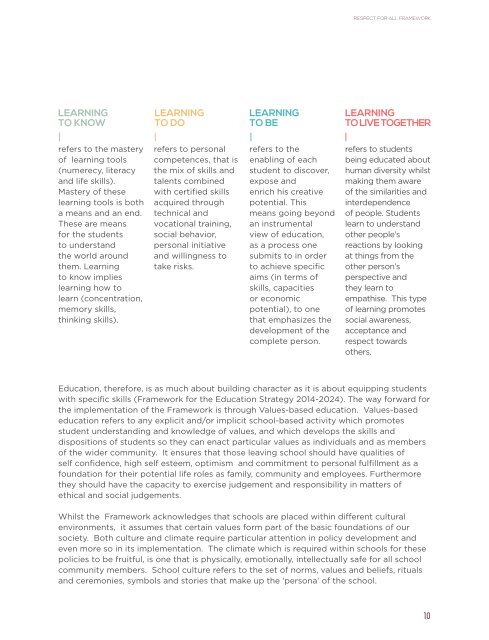Respect For All Document
Respect For All Document
Respect For All Document
You also want an ePaper? Increase the reach of your titles
YUMPU automatically turns print PDFs into web optimized ePapers that Google loves.
RESPECT FOR ALL FRAMEWORK<br />
LEARNING<br />
TO KNOW<br />
LEARNING<br />
TO DO<br />
LEARNING<br />
TO BE<br />
LEARNING<br />
TO LIVE TOGETHER<br />
refers to the mastery<br />
of learning tools<br />
(numerecy, literacy<br />
and life skills).<br />
Mastery of these<br />
learning tools is both<br />
a means and an end.<br />
These are means<br />
for the students<br />
to understand<br />
the world around<br />
them. Learning<br />
to know implies<br />
learning how to<br />
learn (concentration,<br />
memory skills,<br />
thinking skills).<br />
refers to personal<br />
competences, that is<br />
the mix of skills and<br />
talents combined<br />
with certified skills<br />
acquired through<br />
technical and<br />
vocational training,<br />
social behavior,<br />
personal initiative<br />
and willingness to<br />
take risks.<br />
refers to the<br />
enabling of each<br />
student to discover,<br />
expose and<br />
enrich his creative<br />
potential. This<br />
means going beyond<br />
an instrumental<br />
view of education,<br />
as a process one<br />
submits to in order<br />
to achieve specific<br />
aims (in terms of<br />
skills, capacities<br />
or economic<br />
potential), to one<br />
that emphasizes the<br />
development of the<br />
complete person.<br />
refers to students<br />
being educated about<br />
human diversity whilst<br />
making them aware<br />
of the similarities and<br />
interdependence<br />
of people. Students<br />
learn to understand<br />
other people’s<br />
reactions by looking<br />
at things from the<br />
other person’s<br />
perspective and<br />
they learn to<br />
empathise. This type<br />
of learning promotes<br />
social awareness,<br />
acceptance and<br />
respect towards<br />
others.<br />
Education, therefore, is as much about building character as it is about equipping students<br />
with specific skills (Framework for the Education Strategy 2014-2024). The way forward for<br />
the implementation of the Framework is through Values-based education. Values-based<br />
education refers to any explicit and/or implicit school-based activity which promotes<br />
student understanding and knowledge of values, and which develops the skills and<br />
dispositions of students so they can enact particular values as individuals and as members<br />
of the wider community. It ensures that those leaving school should have qualities of<br />
self confidence, high self esteem, optimism and commitment to personal fulfillment as a<br />
foundation for their potential life roles as family, community and employees. Furthermore<br />
they should have the capacity to exercise judgement and responsibility in matters of<br />
ethical and social judgements.<br />
Whilst the Framework acknowledges that schools are placed within different cultural<br />
environments, it assumes that certain values form part of the basic foundations of our<br />
society. Both culture and climate require particular attention in policy development and<br />
even more so in its implementation. The climate which is required within schools for these<br />
policies to be fruitful, is one that is physically, emotionally, intellectually safe for all school<br />
community members. School culture refers to the set of norms, values and beliefs, rituals<br />
and ceremonies, symbols and stories that make up the ‘persona’ of the school.<br />
1o


